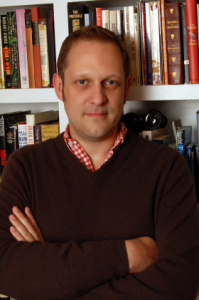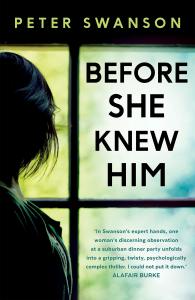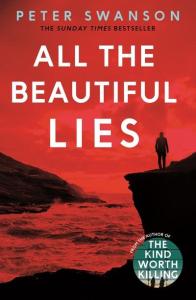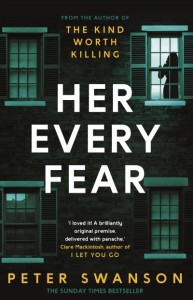Interview with Peter Swanson, author of ‘The Kind Worth Killing’
 Thriller Books Journal is pleased to host Peter Swanson, best-selling author of ‘The Girl with a Clock for a Heart’ and of another intense, gripping crime novel, ‘The Kind Worth Killing’, to be published in the UK in early spring 2015.
Thriller Books Journal is pleased to host Peter Swanson, best-selling author of ‘The Girl with a Clock for a Heart’ and of another intense, gripping crime novel, ‘The Kind Worth Killing’, to be published in the UK in early spring 2015.
[Q]: Hello Peter, nice to meet you and thank you for joining us. Let’s start with some background: was writing crime fiction your first professional calling, and if not, how and when did you start writing?
[A]: Nice meeting you, as well. I’ve always written, ever since I was a young kid. I first started writing crime fiction about twelve years ago. I’d always loved crime fiction, everything from Agatha Christie to hard-boiled pulp, so I thought I’d give it a shot, almost as an experiment, to see if I could start and finish a complete novel. I did finish that first novel, and I enjoyed the process so much that I’ve kept up with it.
[Q]: You have also produced several poetry works. What is it that you find compelling in writing poetry, as opposed to writing prose?
[A]: Poetry, to me, is almost like a game in which you are striving to create this small and perfect piece of art. Reading a great poem is like looking at a flawless painting. I love the challenge of it, even though I don’t think it’s a challenge I ever successfully conquered. These days, I don’t write much poetry anymore. Only when I have a really strong idea, and those come less and less.
[Q]: Before moving to your crime novels, please tells us more about the inspiration for your sequence of sonnets on Alfred Hitchcock films.
[A]: Well, that sequence honestly came about because I was looking for ideas for poems. I hadn’t written anything I liked much in a while except for a persona poem in the voice of the second Mrs. De Winter from ‘Rebecca’, and that gave me the idea of doing a sequence of Hitchcock poems, one for each of the films. That also gave me the excuse for re-watching all of the films I’d seen before, and watching the films I hadn’t for the first time. It was a great wintertime project.
[Q]:In ‘The Girl with a Clock for a Heart’ a man meets again, apparently by chance, a long-lost girlfriend. In ‘The Kind Worth Killing’ one of the protagonists meets, also by chance, a mysterious woman who offers to help him kill his wife. Why are such fortuitous circumstances so significant for you?
[A]: I like the idea of sudden change. That you or me or anyone could go out to a bar one evening, and the random stranger who sits down beside you changes your life forever. It’s actually something that Hitchcock liked a lot himself. Most of his protagonists are accidental ones, just ordinary people who wind up in extraordinary circumstances.
[Q]:The lack of moral scruples some of the characters in ‘The Kind Worth Killing’ show is chilling, yet we only have to browse through the daily news to find many instances of the same. I’ve heard a crime-writing colleague of yours state that people read crime fiction because they want to understand this kind of dark behaviour. What’s your view on this?
[A]: I think most people read dark fiction as a way to escape from reality. I know that sounds counter-intuitive—why read something dark as an escape—but there is something comforting about being safe at home and reading about murder and deception and despicable characters. And in many of these books (I won’t say whether it’s the case in mine), the darkness is corrected by the end of the novel. The world is put back in its place.
[Q]: ‘The Kind Worth Killing’ is also about blurred boundaries: how love can be so intense as to spill over into hatred, how victims can turn into perpetrators. Would you say this is a fair take on the novel, and would you like to comment on this?
[A]: It’s definitely a fair take. I think the character of Lily exemplifies this the most. For her, everything is very black or white, so if she loves someone, and they betray her, she doesn’t see any gray area. She metes out punishment. And I do think that this reflects reality. Apparently the person who is most likely to kill you is the person sitting across from you at breakfast. Because love is such a powerful emotion, it can turn into hate very fast.
[Q]: Finally, which advice would you give to prospective crime fiction authors? What do you think is the key skill to have to produce a good contemporary crime novel?
[A]: Well, the key skill is the ability to sit down and write every day (or close to every day) until the book is done. If you can’t do that, then having the greatest idea in the world, or writing beautiful sentences, is not going to help you. The other skill that’s helpful is the ability to surprise your reader, because a reader who doesn’t know what’s going to happen next is a reader who will keep reading.
TBJ: Thank you very much for your time Peter, and we look forward to reading more of your work soon!






